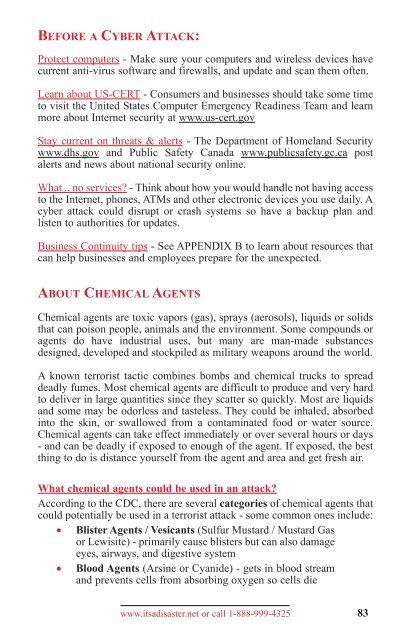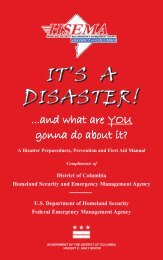disaster 5th 1108_5th ed 2011 - Homeland Security and Emergency ...
disaster 5th 1108_5th ed 2011 - Homeland Security and Emergency ...
disaster 5th 1108_5th ed 2011 - Homeland Security and Emergency ...
Create successful ePaper yourself
Turn your PDF publications into a flip-book with our unique Google optimized e-Paper software.
BEFORE A CYBER ATTACK:<br />
Protect computers - Make sure your computers <strong>and</strong> wireless devices have<br />
current anti-virus software <strong>and</strong> firewalls, <strong>and</strong> update <strong>and</strong> scan them often.<br />
Learn about US-CERT - Consumers <strong>and</strong> businesses should take some time<br />
to visit the Unit<strong>ed</strong> States Computer <strong>Emergency</strong> Readiness Team <strong>and</strong> learn<br />
more about Internet security at www.us-cert.gov<br />
Stay current on threats & alerts - The Department of <strong>Homel<strong>and</strong></strong> <strong>Security</strong><br />
www.dhs.gov <strong>and</strong> Public Safety Canada www.publicsafety.gc.ca post<br />
alerts <strong>and</strong> news about national security online.<br />
What .. no services - Think about how you would h<strong>and</strong>le not having access<br />
to the Internet, phones, ATMs <strong>and</strong> other electronic devices you use daily. A<br />
cyber attack could disrupt or crash systems so have a backup plan <strong>and</strong><br />
listen to authorities for updates.<br />
Business Continuity tips - See APPENDIX B to learn about resources that<br />
can help businesses <strong>and</strong> employees prepare for the unexpect<strong>ed</strong>.<br />
ABOUT CHEMICAL AGENTS<br />
Chemical agents are toxic vapors (gas), sprays (aerosols), liquids or solids<br />
that can poison people, animals <strong>and</strong> the environment. Some compounds or<br />
agents do have industrial uses, but many are man-made substances<br />
design<strong>ed</strong>, develop<strong>ed</strong> <strong>and</strong> stockpil<strong>ed</strong> as military weapons around the world.<br />
A known terrorist tactic combines bombs <strong>and</strong> chemical trucks to spread<br />
deadly fumes. Most chemical agents are difficult to produce <strong>and</strong> very hard<br />
to deliver in large quantities since they scatter so quickly. Most are liquids<br />
<strong>and</strong> some may be odorless <strong>and</strong> tasteless. They could be inhal<strong>ed</strong>, absorb<strong>ed</strong><br />
into the skin, or swallow<strong>ed</strong> from a contaminat<strong>ed</strong> food or water source.<br />
Chemical agents can take effect imm<strong>ed</strong>iately or over several hours or days<br />
- <strong>and</strong> can be deadly if expos<strong>ed</strong> to enough of the agent. If expos<strong>ed</strong>, the best<br />
thing to do is distance yourself from the agent <strong>and</strong> area <strong>and</strong> get fresh air.<br />
What chemical agents could be us<strong>ed</strong> in an attack<br />
According to the CDC, there are several categories of chemical agents that<br />
could potentially be us<strong>ed</strong> in a terrorist attack - some common ones include:<br />
• Blister Agents / Vesicants (Sulfur Mustard / Mustard Gas<br />
or Lewisite) - primarily cause blisters but can also damage<br />
eyes, airways, <strong>and</strong> digestive system<br />
• Blood Agents (Arsine or Cyanide) - gets in blood stream<br />
<strong>and</strong> prevents cells from absorbing oxygen so cells die<br />
www.itsa<strong>disaster</strong>.net or call 1-888-999-4325<br />
83





